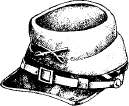

Charles called for Caleb when he got to the barn. When the boy didn’t know about the letter, he asked him to saddle up a horse while he rifled through his Bible. Charles didn’t recall sticking the thin envelope into its pages, but where was it?
He searched the buggy. Nothing.
When Caleb led out the mare Daisy, Charles climbed into the saddle and took off.
After all the trips to school, Charles knew the road well. He sped past the graves, rounded the hill, dropped down with the road to the river, and soon reached the Stovall Academy, a rough-hewn log cabin with two classrooms. All along, he scanned the road, but the countryside held no stray envelopes.
He stopped at Professor Stovall’s door, but the man hadn’t seen a letter. Charles continued on toward town and church.
No luck.
His heart sank when he reached the Methodist Episcopal Church and saw Colonel Hanks talking with Jack Willard, another former prisoner from Fort Delaware.
“I thought you went home,” Hanks said.
“I’m trying to find the letter.”
Hanks winced. “You lost Jenny’s letter from the Army?”
Charles touched his pocket then sat up straight in the saddle. He’d suffered a powerful man’s disapproval before. “Yes, sir.”
“You’re not doing well by her if you lose important mail.” The colonel’s eyes narrowed. “I suggest you solve this problem.”
He caught his hand before he saluted. “Yes, sir.”
Hanks shook hands with Willard. “I’ll see you at the memorial wreath laying. Thanks for doing this. Good day, men.” The colonel walked toward his house.
Charles replayed the envelope incident in his mind. Hanks had stopped him at the buggy following the service, reached into his coat pocket, and pulled out the letter. They’d spoken briefly about the potential contents and what it could mean to the family. Charles had examined the small red profile of Washington on the three-cent stamp. He’d agreed to give the letter to Jenny, set it beside his Bible on the buggy seat, and climbed in.
Surely he had put it in his pocket.
Or had he?
Ma Duncan had shrieked when the buggy started. Charles closed his eyes to think. Did Ma Duncan pick up the letter? Why?
“Huh.” He turned the horse toward the road home.
Jack Willard called after him. “You joining us the last Friday of the month to remember our fallen soldiers?”
Charles halted. “What time and where?”
“In front of the cemetery, around four. My wife wants to lay a wreath to honor the men we lost, particularly the Peck boys and James Tubb.”
“Should I bring Jenny Duncan?”
Willard spat tobacco juice into the dirt. “Maybe if we could forget her last name is Duncan. What are you doing out there? Does she know what Tom did to Ben when he tried to escape?”
“Not yet.” Charles held himself steady under Willard’s scrutiny.
Willard crossed his arms. “Tom Duncan wasn’t a bad kid when he left here, but gambling turned his head. Maybe if there’d been no war and he’d stayed in Anderson County he never would have learned to gamble. But it got in his blood, and he lost all sense. What was he thinking betting against Ben like that?”
“Prison did strange things to men,” Charles said.
“Really? What’d it do to you? Turned you into a holy roller.”
“I bet for Ben that night, and it’s haunted me ever since. I’ve never taken another bet since.”
Willard squinted at him. “You’ve never taken another bet? I doubt it. Still carrying them good-luck dice?”
Charles pressed his lips together and suppressed the urge to touch his pocket.
“I figured so. It’s in your blood, too, Moss. You gamblers never change.” Willard spat again and stalked off.
What a miserable Sunday, Charles thought. Willard was right about the urge to gamble never leaving a man, which is why Charles carried the dice as a reminder.
He’d failed Ben Peck, a young man he’d liked, on a wild rainy Delaware night. How many times had he relived the night Ben watched Tom Duncan take bets on his chances of success? With the numbers running against the young man, Charles couldn’t bear the discouragement on his face. He’d anted up for Ben, and a dozen others joined him.
Afterward, Ben shook his hand. “Thanks. I needed someone to boost my confidence.”
Then he drowned.
Charles kicked and the mare took off, moving like the wind along the dusty Sunday road. Charles put his head down and raced for all he was worth, repeating, “If only, if only.”
A flash past the school reminded him of the preacher’s words that morning. “For freedom Christ has set us free; stand no more under the yoke of slavery to sin.”
He’d confessed the sin. He’d been forgiven. He just wished he didn’t see Ben’s eyes in Jenny’s face.
Charles focused on the horse. Fleet of foot, she galloped with a smooth stride. He’d love to see her racing against his family’s stable in Lexington. She’d give them a run for their money. He groaned. Why couldn’t he shake the racing lure? He’d vowed to never take a bet again.
Charles touched the reins to slow the fabulous mare to a walk. The farm was in sight, and he needed to prepare himself to reenter his payback prison.